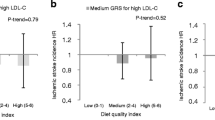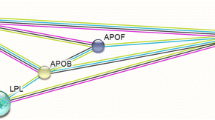Abstract
Cardiovascular diseases (CVD) result from complex interactions between genetic and environmental factors. The evidence supports that gene-environment interactions modulate plasma lipid concentrations and potentially CVD risk. The findings from studies examining gene-diet interactions and lipid metabolism have been promising. Several loci (eg, APOA1, APOE, LIPC) are providing proof of concept for the application of genetics in the context of personalized nutrition for CVD prevention. The spectrum of candidate genes has been expanding to incorporate those involved in intracellular lipid metabolism (eg, iPPARs, CYP7A1). However, the practical application of these findings is not ready for prime time. There is a compelling need for replication using a higher level of scientific evidence. Moreover, we need to evolve from the simple scenarios examined nowadays (ie, one single dietary component, SNP, and risk factor) to more realistic situations involving multiple interactions. In summary, there is need for both large population studies and well-standardized intervention studies.
Similar content being viewed by others
References and Recommended Reading
Breslow JL: Genetics of lipoprotein abnormalities associated with coronary artery disease susceptibility. Annu Rev Genet 2000, 34:233–254.
Lusis AJ, Mar R, Pajukanta P: Genetics of atherosclerosis. Annu Rev Genomics Hum Genet 2004, 5:189–218.
Ordovas JM: HDL genetics: candidate genes, genome wide scans and gene-environment interactions. Cardiovasc Drugs Ther 2002, 16:273–281.
Ordovas JM, Mooser V: The APOE locus and the pharmacogenetics of lipid response. Curr Opin Lipidol 2002, 13:113–117.
Ordovas JM: Genetic polymorphisms and activity of cholesterol ester transfer protein(CETP): should we be measuring them? Clin Chem Lab Med 2000, 38:945–949.
Humphries SE, Montgomery HE, Talmud PJ: Predisposing genes, high-risk environments and coronary artery disease: LPL and fibrinogen as examples. World Rev Nutr Diet 2001, 89:61–67.
Pennacchio LA, Rubin EM: Apolipoprotein A5, a newly identified gene that affects plasma triglyceride levels in humans and mice. Arterioscler Thromb Vasc Biol 2003, 23:529–534.
Ottman R: An epidemiological approach to gene-environment interaction. Genet Epidemiol 1990, 7:177–185.
Kardia SL: Context-dependent genetic effects in hypertension. Curr Hypertens Rep 2000, 2:32–38.
Holtzman NA: Genetic variation in nutritional requirements and susceptibility to disease: policy implications. Am J Clin Nutr 1988, 48:1510–1516.
Jacobs DR Jr, Anderson JT, Hannan P, et al.: Variability in individual serum cholesterol response to change in diet. Arteriosclerosis 1983, 3:349–356.
Katan MB, Beynen AC, De Vries JH, Nobels A: Existence of consistent hypo- and hyperresponders to dietary cholesterol in man. Am J Epidemiol 1986, 123:221–234.
Katan MB, Grundy SM, Willett WC: Should a low-fat, high-carbohydrate diet be recommended for everyone? Beyond lowfat diets. N Engl J Med 1997, 337:563–566.
Krauss RM: Dietary and genetic effects on low-density lipoprotein heterogeneity. Annu Rev Nutr 2001, 21:283–295.
Jacobs B, De Angelis-Schierbaum G, Egert S, et al.: Individual serum triglyceride responses to high-fat and low-fat diets differ in men with modest and severe hypertriglyceridemia. J Nutr 2004, 134:1400–1405.
Parks EJ, Rutledge JC, Davis PA, et al.: Predictors of plasma triglyceride elevation in patients participating in a coronary atherosclerosis treatment program. J Cardiopulm Rehabil 2001, 21:73–79.
Loktionov A: Common gene polymorphisms and nutrition: emerging links with pathogenesis of multifactorial chronic diseases. J Nutr Biochem 2003, 14:426–451.
Jansen AC, van Wissen S, Defesche JC, Kastelein JJ: Phenotypic variability in familial hypercholesterolaemia: an update. Curr Opin Lipidol 2002, 13:165–171.
Bertolini S, Pisciotta L, Di Scala L, et al.: Genetic polymorphisms affecting the phenotypic expression of familial hypercholesterolemia. Atherosclerosis 2004, 174:57–65.
Williams RR, Hasstedt SJ, Wilson DE, et al.: Evidence that men with familial hypercholesterolemia can avoid early coronary death. An analysis of 77 gene carriers in four Utah pedigrees. JAMA 1986, 255:219–224.
Sijbrands EJ, Westendorp RG, Defesche JC, et al.: Mortality over two centuries in large pedigree with familial hypercholesterolaemia: family tree mortality study. BMJ 2001, 322:1019–1023.
Pimstone SN, Sun XM, du Souich C, et al.: Phenotypic variation in heterozygous familial hypercholesterolemia: a comparison of Chinese patients with the same or similar mutations in the LDL receptor gene in China or Canada. Arterioscler Thromb Vasc Biol 1998, 18:309–315.
Sun XM, Patel DD, Webb JC, et al.: Familial hypercholesterolemia in China. Identification of mutations in the LDLreceptor gene that result in a receptor-negative phenotype. Arterioscler Thromb 1994, 14:85–94.
Poustie VJ, Rutherford P: Dietary treatment for familial hypercholesterolaemia. Cochrane Database Syst Rev 2001, 2:CD001918.
Civeira F, International Panel on Management of Familial Hypercholesterolemia: Guidelines for the diagnosis and management of heterozygous familial hypercholesterolemia. Atherosclerosis 2004, 173:55–68.
Masson LF, McNeill G, Avenell A: Genetic variation and the lipid response to dietary intervention: a systematic review. Am J Clin Nutr 2003, 77:1098–1111. Comprehensive review of the intervention studies addressing genediet interactions and plasma lipids until 2002.
Corella D, Ordovas JM: Single Nucleotide polymorphisms that influence lipid metabolism: interaction with dietary factors. Annu Rev Nutr 2004, 5:71–118. State of the art review of the field of nutrigenetics as it relates to lipid metabolism and CVD risk.
Ordovas JM, Corella D: Genes, diet and plasma lipids: the evidence from observational studies. World Rev Nutr Diet 2004, 93:41–76.
Ordovas JM, Corella D: Nutritional genomics. Annu Rev Genomics Hum Genet 2004, 5:71–118.
Moreno JA, Perez-Jimenez F, Marin C, et al.: Apolipoprotein E gene promoter -219G->T polymorphism increases LDL-cholesterol concentrations and susceptibility to oxidation in response to a diet rich in saturated fat. Am J Clin Nutr 2004, 80:1404–1409.
Kovar J, Suchanek P, Hubacek JA, Poledne R: The A-204C polymorphism in the cholesterol 7alpha-hydroxylase (CYP7A1) gene determines the cholesterolemia responsiveness to a high-fat diet. Physiol Res 2004, 53:565–568.
Hofman MK, Weggemans RM, Zock PL, et al.: CYP7A1 A-278C polymorphism affects the response of plasma lipids after dietary cholesterol or cafestol interventions in humans. J Nutr 2004, 134:2200–2204.
Markovic O, O’Reilly G, Fussell HM, et al.: Role of single nucleotide polymorphisms of pro-inflammatory cytokine genes in the relationship between serum lipids and inflammatory parameters, and the lipid-lowering effect of fish oil in healthy males. Clin Nutr 2004, 23:1084–1095.
Paradis AM, Fontaine-Bisson B, Bosse Y, et al.: The peroxisome proliferator-activated receptor alpha Leu162Val polymorphism influences the metabolic response to a dietary intervention altering fatty acid proportions in healthy men. Am J Clin Nutr 2005, 81:523–530.
Perez-Martinez P, Perez-Jimenez F, Bellido C, et al.: A polymorphism exon 1 variant at the locus of the scavenger receptor class B type I (SCARB1) gene is associated with differences in insulin sensitivity in healthy people during the consumption of an olive oil-rich diet. J Clin Endocrinol Metab 2005, 90:2297–2300.
Paschos GK, Yiannakouris N, Rallidis LS, et al.: Apolipoprotein E genotype in dyslipidemic patients and response of blood lipids and inflammatory markers to alpha-linolenic Acid. Angiology 2005, 56:49–60.
Jemaa R, Mebazaa A, Fumeron F: Apolipoprotein B signal peptide polymorphism and plasma LDL-cholesterol response to low-calorie diet. Int J Obes Relat Metab Disord 2004, 28:902–905.
Tobin MD, Minelli C, Burton PR, et al.: Development of Mendelian randomization: from hypothesis test to ‘Mendelian deconfounding’. Int J Epidemiol 2004, 33:26–29.
Tai ES, Corella D, Demissie S, et al.: Polyunsaturated fatty acids interact with the PPARA-L162V polymorphism to affect plasma triglyceride and apolipoprotein C-III concentrations in the Framingham Heart Study. J Nutr 2005, 135:397–403. Original research describing a significant interaction between the PPARá locus and TAG concentrations in Framingham. Both, dietary n-6 and n-3 PUFAs are examined.
Olivieri O, Martinelli N, Sandri M, et al.: Apolipoprotein C-III, n-3 polyunsaturated fatty acids, and “insulin-resistant” T-455C APOC3 gene polymorphism in heart disease patients: example of gene-diet interaction. Clin Chem 2005, 51:360–367.
Robitaille J, Brouillette C, Lemieux S, et al.: Plasma concentrations of apolipoprotein B are modulated by a gene—diet interaction effect between the LFABP T94A polymorphism and dietary fat intake in French-Canadian men. Mol Genet Metab 2004, 82:296–303.
Lee J, Tan CS, Chia KS, et al.: The lipoprotein lipase S447X polymorphism and plasma lipids: interactions with APOE polymorphisms, smoking, and alcohol consumption. J Lipid Res 2004, 45:1132–1139.
Dwyer JH, Allayee H, Dwyer KM, et al.: Arachidonate 5-lipoxygenase promoter genotype, dietary arachidonic acid, and atherosclerosis. N Engl J Med 2004, 350:29–37. Excellent article highlighting the need to discriminate between n-6 and n-3 dietary fats when addressing gene-diet interactions. Moreover, they use subclinical measures of diseases as outcome.
Ordovas JM: Genetics, postprandial lipemia and obesity. Nutr Metab Cardiovasc Dis 2001, 11:118–133.
Zilversmit DB: Atherogenesis: a postprandial phenomenon. Circulation 1979, 60:473–485.
Dworatzek PD, Hegele RA, Wolever TM: Postprandial lipemia in subjects with the threonine 54 variant of the fatty acidbinding protein 2 gene is dependent on the type of fat ingested. Am J Clin Nutr 2004, 79:1110–1117.
Lopez-Miranda J, Cruz G, Gomez P, et al.: The influence of lipoprotein lipase gene variation on postprandial lipoprotein metabolism. J Clin Endocrinol Metab 2004, 89:4721–4728.
Perez-Martinez P, Lopez-Miranda J, Ordovas JM, et al.: Postprandial lipemia is modified by the presence of the polymorphism present in the exon 1 variant at the SR-BI gene locus. J Mol Endocrinol 2004, 32:237–245.
van Ommen B, Stierum R: Nutrigenomics: exploiting systems biology in the nutrition and health arena. Curr Opin Biotechnol 2002, 13:517–521.
Author information
Authors and Affiliations
Rights and permissions
About this article
Cite this article
Ordovas, J.M., Corella, D. Genetic variation and lipid metabolism: Modulation by dietary factors. Curr Cardiol Rep 7, 480–486 (2005). https://doi.org/10.1007/s11886-005-0067-6
Issue Date:
DOI: https://doi.org/10.1007/s11886-005-0067-6




